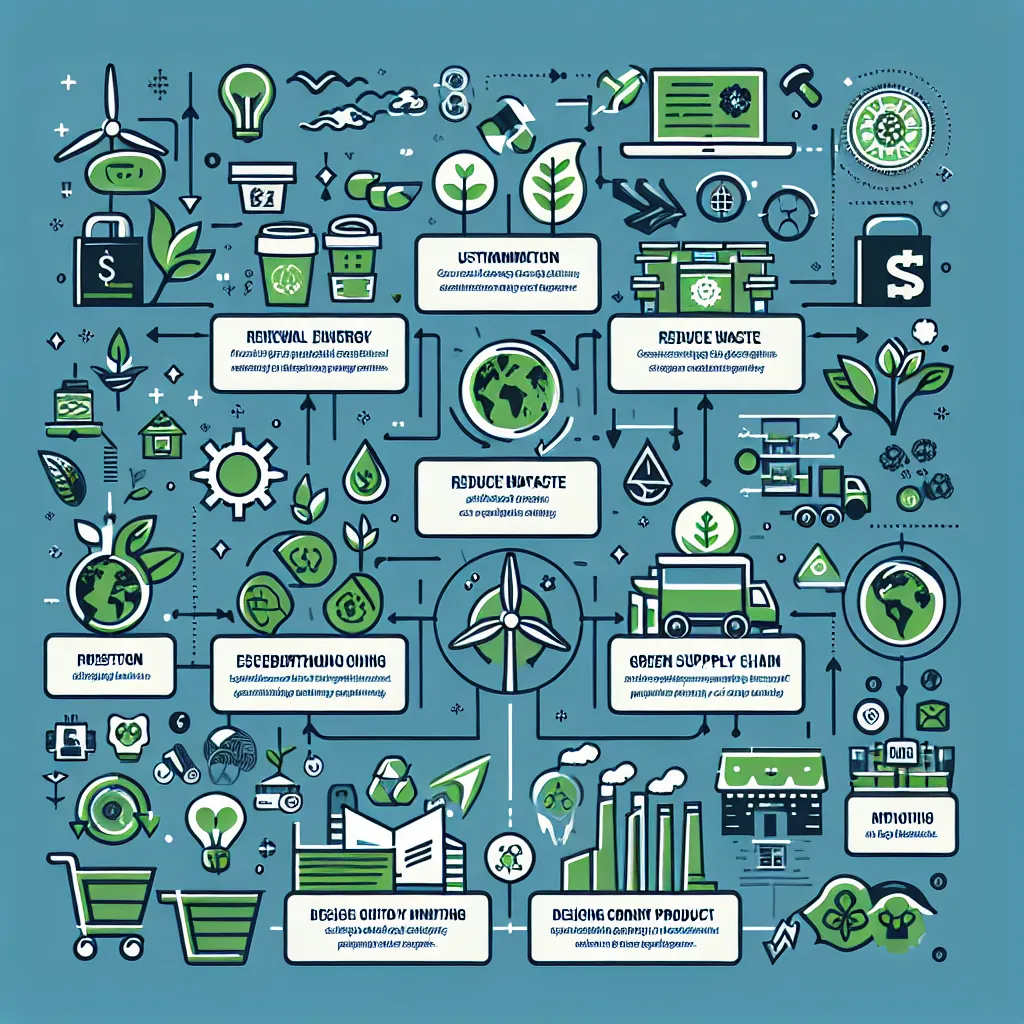Environmental sustainability in business has become an increasingly prevalent topic in IELTS Writing Task 2 essays. Based on recent trends and the growing global focus on sustainable practices, it’s highly likely that this theme will continue to appear frequently in future IELTS exams. Let’s explore a sample question and provide model answers to help you prepare for this important topic.
Analyzing the Topic
Before we dive into a specific question, it’s crucial to understand the broader context of environmental sustainability in business. This topic encompasses various aspects such as:
- Corporate social responsibility
- Green technologies and practices
- Waste reduction and recycling
- Energy efficiency
- Sustainable supply chains
- Eco-friendly product development
These elements often form the basis of IELTS Writing Task 2 questions related to this theme.
Sample Question
Let’s consider the following question, which is representative of the type you might encounter in an IELTS exam:
Some people believe that businesses should prioritize environmental sustainability over profit. To what extent do you agree or disagree with this statement?
Question Analysis
This question requires you to:
- Understand the concept of environmental sustainability in business
- Consider the relationship between sustainability and profit
- Form an opinion on whether sustainability should take precedence over profit
- Provide reasons and examples to support your viewpoint
Remember, there’s no “correct” answer – the examiners are looking for a well-structured, coherent argument that addresses all parts of the question.
Model Essay (Band 7-8)
Here’s a sample essay that would likely score in the Band 7-8 range:
In recent years, the debate over whether businesses should prioritize environmental sustainability over profit has gained significant traction. While some argue that companies have a moral obligation to protect the environment, others contend that profitability is essential for a business’s survival and growth. In my opinion, businesses should strive to balance both objectives, as environmental sustainability and profitability are not mutually exclusive and can often be complementary.
Firstly, it is undeniable that businesses have a responsibility to minimize their environmental impact. The Earth’s resources are finite, and corporate activities often contribute significantly to pollution, deforestation, and climate change. By prioritizing sustainability, companies can help preserve the planet for future generations and contribute to the well-being of society as a whole. Moreover, sustainable practices can lead to long-term cost savings through improved efficiency and reduced waste, demonstrating that environmental responsibility can align with financial interests.
However, it would be unrealistic and potentially counterproductive to expect businesses to prioritize sustainability at the complete expense of profit. Profitability is crucial for a company’s survival, enabling it to invest in research and development, create jobs, and contribute to economic growth. Without financial stability, businesses would be unable to implement sustainable practices or invest in green technologies. Furthermore, profitable companies are better positioned to influence industry standards and drive wider adoption of environmentally friendly practices.
The key lies in finding a balance between sustainability and profitability. Many successful companies have demonstrated that it is possible to achieve both objectives simultaneously. For instance, renewable energy companies have shown that providing environmentally friendly solutions can be highly profitable. Similarly, large corporations that have invested in sustainable supply chains and eco-friendly product development have often seen increased consumer loyalty and brand value, ultimately boosting their bottom line.
In conclusion, while environmental sustainability is undoubtedly crucial, it should not come at the complete expense of profitability. Instead, businesses should aim to integrate sustainable practices into their core strategies, recognizing that long-term success depends on both financial health and environmental responsibility. By doing so, companies can contribute to a more sustainable future while ensuring their own viability and growth.
(Word count: 339)
 Sustainable Business Practices
Sustainable Business Practices
Model Essay (Band 6-7)
Now, let’s look at a sample essay that would likely score in the Band 6-7 range:
The question of whether businesses should prioritize environmental sustainability over profit is a complex one. In my opinion, while environmental sustainability is very important, businesses need to find a balance between being environmentally friendly and making profit.
On one hand, it’s clear that businesses have a big impact on the environment. They use a lot of resources and can cause pollution. If companies focus more on sustainability, they can help protect the environment for the future. This is important because we all need a healthy planet to live on. Also, some customers prefer to buy from companies that care about the environment, so being sustainable can actually help a business attract more customers.
However, we can’t forget that businesses need to make money to survive. If a company doesn’t make profit, it will have to close down. This means people will lose their jobs, and the economy will suffer. Also, if a business is not profitable, it won’t have money to invest in new technologies that could help the environment. So, profit is still important for businesses.
I think the best approach is for businesses to try to be sustainable while still making profit. There are many examples of companies that have found ways to do both. For instance, some companies have started using renewable energy, which is good for the environment and can save them money in the long run. Other businesses have created new products that are eco-friendly and popular with customers.
In conclusion, while environmental sustainability is very important, I don’t think businesses should focus on it completely at the expense of profit. Instead, they should try to find ways to be environmentally friendly that also help them make money. This way, they can contribute to protecting the environment while still being successful businesses.
(Word count: 295)
Writing Tips
When addressing this topic, keep the following in mind:
- Structure: Ensure your essay has a clear introduction, body paragraphs, and conclusion.
- Balance: Present both sides of the argument before stating your opinion.
- Examples: Use specific examples to support your points. This could include mentioning real companies or hypothetical scenarios.
- Vocabulary: Use a range of vocabulary related to business and the environment. Higher band scores require more sophisticated language use.
- Grammar: Vary your sentence structures and use complex sentences where appropriate.
Key Vocabulary
Here are some useful terms for discussing this topic:
-
Corporate social responsibility (noun) /ˌkɔːrpərət ˌsəʊʃəl rɪˌspɒnsəˈbɪləti/: The idea that businesses should act in ways that benefit society.
-
Sustainability (noun) /səˌsteɪnəˈbɪləti/: The ability to maintain or support a process continuously over time.
-
Eco-friendly (adjective) /ˌiːkəʊ ˈfrendli/: Not harmful to the environment.
-
Carbon footprint (noun) /ˈkɑːbən ˌfʊtprɪnt/: The amount of carbon dioxide released into the atmosphere as a result of someone’s activities.
-
Green technology (noun) /ɡriːn tekˈnɒlədʒi/: Technology that is environmentally friendly.
-
Triple bottom line (noun) /ˈtrɪpl ˈbɒtəm laɪn/: A business concept that focuses on social, environmental, and financial success.
-
Renewable energy (noun) /rɪˈnjuːəbl ˈenədʒi/: Energy from a source that is not depleted when used.
-
Circular economy (noun) /ˈsɜːkjələr iˈkɒnəmi/: An economic system aimed at eliminating waste and the continual use of resources.
Conclusion
The importance of environmental sustainability in business is a crucial topic in today’s world and is likely to remain relevant in future IELTS exams. By understanding the key concepts, practicing with sample questions, and expanding your vocabulary, you’ll be well-prepared to tackle this subject in your Writing Task 2 essay.
For further practice, consider exploring related topics such as:
- The role of government in promoting sustainable business practices
- The impact of consumer choices on corporate environmental policies
- The challenges of implementing sustainable practices in developing countries
- The potential of green technology to transform traditional industries
Remember, the key to success in IELTS Writing Task 2 is not just knowledge of the topic, but also the ability to structure your ideas clearly and use appropriate language. Keep practicing, and good luck with your IELTS preparation!


